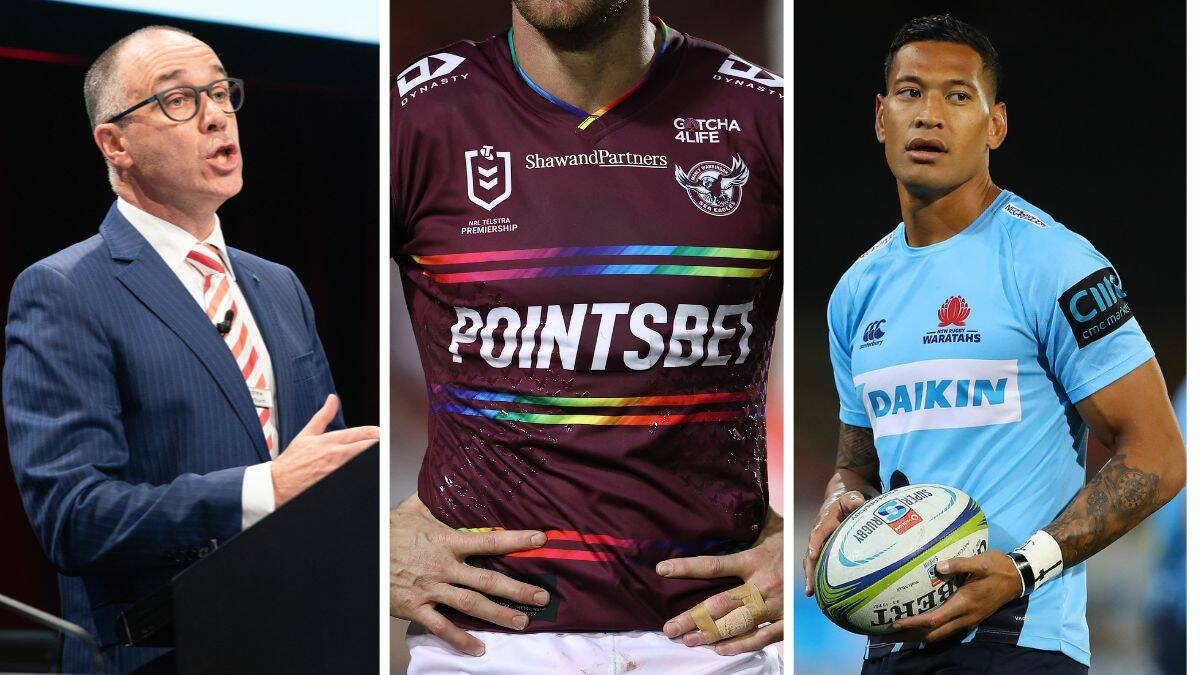
Freedom of religion legislation is still to be resolved successfully. The Morrison government couldn't do it. The Albanese government has promised to legislate on this matter during its term in office despite the obvious difficulties in resolving deep differences of opinion. Labor senator Deborah O'Neill has recently reaffirmed the government's intention, although former Liberal MP Tim Wilson has again questioned the merits of doing so.
Subscribe now for unlimited access.
$0/
(min cost $0)
or signup to continue reading
Recent events within the nation's football codes, a useful social barometer, demonstrate the extreme divisiveness of freedom of religion in the community. The Essendon Football Club in the AFL has now followed Manly in the NRL and the NSW Waratahs in rugby union in being caught up in controversy.
Yet again it has been the tension between openly negative attitudes towards homosexuality and commitments to social inclusion which has become the inflammatory issue. In Super Rugby it was Israel Folau's public posts calling homosexuality sinful. In the NRL it was some players refusing to wear a pride jumper because of their cultural and religious beliefs.
In the case of Essendon, the controversy is over the recently appointed CEO, Andrew Thorburn, formerly the National Australia Bank CEO, who resigned after just 24 hours in the job. Thorburn is the chairman of the City on a Hill group of conservative Anglican churches, whose Melbourne church, using extravagant language, strongly opposed abortion and condemned homosexuality as a sin. Even its supporters, such as federal Opposition Leader Peter Dutton, admitted that the language used in a 2013 sermon posted on the church website was inappropriate, comparing the record of abortion to that of concentration camps, and the church itself later withdrew it and issued an apology.
When asked to choose between his role at the church and his job at the football club, Thorburn chose his church and resigned immediately, claiming threats to freedom of religion. The club framed its choice as a tension between the club's inclusive values and conservative Christian values. It soon became a national issue with the Anglican Bishop of South Sydney Michael Steed, as chair of the conservative lobby group Freedom for Faith supporting Thorburn.
Club members and supporters played a major role on both sides. The Purple Bombers, Essendon's LGBTIQA+ supporter group, criticised the appointment and were pleased that it was rescinded, but the high-profile participants were the Victorian Premier Daniel Andrews, and the Catholic Archbishop of Melbourne Peter Comensoli. Both were Essendon members. Andrews is a Catholic too, so there were echoes of US President Joe Biden's standoff with American Catholic bishops.
Both leaders used exaggerated language and should have been more careful.
Andrews condemned the City on a Hill church for bigotry and hatred and expressed disappointment in Essendon's appointment of Thorburn, though he indicated that he would maintain his membership. The Victorian Liberal Opposition Leader Mathew Guy then criticised Andrews for "disrespectful discourse".
Comensoli described Essendon's decision as "a chilling message to ordinary faith believers in Victoria that they can't be trusted to exercise leadership and service in the community." He indicated that he would be ceasing his club membership in protest.
READ MORE:
Andrews pushed back against his own faith leader: "I'm a Catholic. I send my kids to Catholic schools. My faith is important to me and guides me every day." Clearly just what is mainstream within Australian Christianity, a critical issue, is open for debate.
Other faith leaders, like prominent Baptist Rev Tim Costello, called for a bill of rights as a possible solution to these disputes.
None of the major participants in this sorry saga are without fault. Unfortunately, in this era of culture wars such controversies often feature more heat than light. Competing ideological and theological positions are set in stone across the board.
Football club corporates, like many professional sporting organisations, are torn between commercial concerns and broader social interests. Even judged by corporate criteria effectively sacking a new CEO after 24 hours shows a lack of due diligence and ultimately was unfair to the appointee. Issues of his compatibility with club culture should have been resolved before the position was offered.
Club members, by contrast, are generally powerless and mainly passive in the face of elite cliques from the big end of town who run most big professional sporting organisations. Members are expected to pay their fees, support their teams, and take what they are given from above. In this case they spoke up.
Language is important. Leaders in the public square, like archbishops and premiers, often shoot from the hip, inflaming rather than calming the situation. Church leaders rarely consult with their own constituencies on social issues like LGBTIQA+ inclusion.
Other political leaders, drawn in by the media, are tempted to take political advantage by scoring cheap political points.
The media coverage of religious matters is often superficial and uses generic terms, like faith leaders, much too loosely. In this case conservative faith leaders who don't speak for all Christians were allowed to speak for the whole faith community. In a largely secular society with falling church attendance the wider community has little idea what is going on within churches anyway and generally couldn't care.
This controversy demonstrates once again how issues with a religious-cultural component, like sexuality, now polarise our society most deeply and are the most difficult for politics to resolve harmoniously. The promise by the Labor government to legislate for freedom of religion before the end of its first term will turn out to be another big hurdle to jump.
- John Warhurst is an emeritus professor of political science at the Australian National University.


